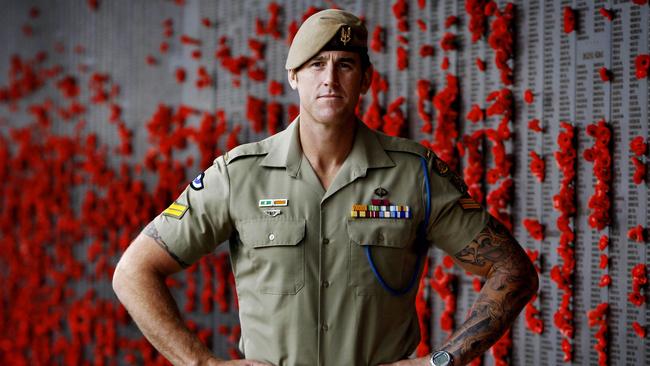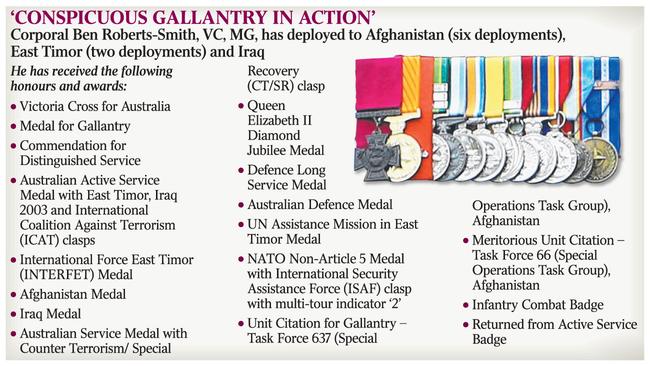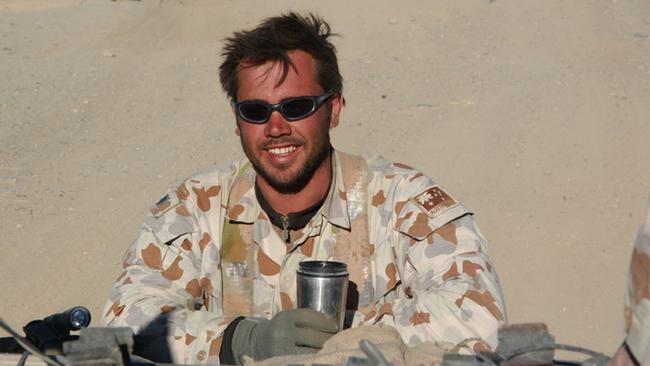No Front Line: An explosive account of death in Afghanistan

Ben Roberts-Smith thought impossible phone calls to special forces wives were a thing of his past. But Australia’s most decorated soldier had to phone Leigh Locke-Thomas this week and tell it to her straight: the 10th anniversary of the death of her husband, Sergeant Matthew Locke, on October 25 will coincide with the release day of a Defence-facilitated history of our special forces in Afghanistan that Roberts-Smith considers damaging to “the legacy of an Australian hero killed in action”, his dear mate Matthew Locke. And again, Leigh Locke-Thomas was drawn back to the Chora Valley.
The book, No Front Line by celebrated journalist Chris Masters, revisits a militarily complex incident in the perilous Afghanistan valley in June 2006 in which then-Lance Corporal Roberts-Smith and Locke, the recipient of a Medal for Gallantry who was killed in action in 2007 — “neutralised” a young Afghan male who threatened to compromise their small and clandestine SAS patrol’s concealment. The book uses competing soldier accounts to put question marks over the need for killing the suspected Taliban “spotter” and Roberts-Smith and Locke’s management of the incident, as well as highlighting an interview with Roberts-Smith five years after the incident in which he mistakenly refers to two suspected spotters encroaching on the patrol instead of one.
The Victoria Cross recipient’s assessment of the book is as blunt as his battlefield leadership style was hard: “inaccurate”, “un-Australian”, “bewildering”, “a stitched together set of memories, rumours and some truths”.
“People are going to think and say what they like (about me),” Roberts-Smith tells The Weekend Australian. “In regards to what the book means to other people, though, I’m a little bit disappointed. Particularly in a passage around myself and Matthew Locke in 2006, (Masters) is really affecting the legacy of an Australian hero killed in action. And I struggle with that, right. You know, Matt’s family. His son is in the army now. That’s not fair.
“Those people have given a lot. A lot of those wives, and families that have lost their fathers. When you sit down with them — and I do this regularly … I saw Blaine Diddams’ wife today (SASR sergeant Diddams was killed in action in 2012) and I see Leigh Locke all the time and I spoke to her today — and I’m trying to break it to them that there’s a bit of this and a bit of that in this book coming out.
“That’s pretty hard to do because my respect for their sacrifice is phenomenal, as it should be from every Australian, because they’ve given something that no person or family should ever have to give.
“And I think that watching their kids grow up, having to read a book like that, that maybe doesn’t paint the SAS in a good light, you know, it’s un-Australian. That’s probably the best way to put it. It’s not what you should do in a book about veterans.
“I find it a little bit bewildering.”

Masters’s book highlights contradictory accounts about the killing of a young Afghan male that occurred near an SAS observation post on a mountain overlooking Chora on June 2 in 2006.
He cites an interview given to the Australian War Memorial in 2011 in which Roberts-Smith describes the incident as involving two men who had walked up to within 30m of their position. In the interview, Roberts-Smith says a decision had been made to eliminate the pair and he and Locke had shot both men. Masters references a later interview with The Australian, in which Roberts-Smith referred to a single enemy.
The patrol report compiled after the incident mentions a single individual, according to Masters.
In responding to the discrepancy, Roberts-Smith wrote to Australian War Memorial director Brendan Nelson stating he had confused the incident due to the fact he’d done numerous tours of Afghanistan and it was years after the fact.
The incident preceded a deadly fire fight after which Locke and Roberts-Smith received Medal for Gallantry recommendations.
Roberts-Smith believes a disgruntled soldier is the source of the controversy.
“The person who has given their depiction of 2006 had nothing to do with me,” Roberts-Smith says. “He was disciplined by the patrol commander and Matt Locke, and removed from our patrol, subsequently retested, and then removed from the SAS. And that was the person who is now making claims about what happened 11 years ago and I think that really says it all.
“There’s an agenda there against Matt Locke and, for whatever reason, because I’ve got the profile, it’s better to throw my name into the mix because you know it’s going to be a headline and that’s essentially why I’m being dragged into it.
“You can’t play off interpersonal issues. You have to focus on the facts. Stick to the facts and use the reporting that was done at the time, very clinical reporting of what is a historic moment in our military history. I don’t think it’s fair to Matt Locke to have his legacy changed by some insinuation that perhaps he’s not done the right thing.
“That’s ridiculous.”
Masters was unavailable to comment yesterday. Publishers Allen & Unwin yesterday defended the book, saying Masters “was a highly professional journalist who approached his subjects with both balance and meticulous research”.
Editorial director Rebecca Kaiser says Roberts-Smith “was shown all content relating to him in early July and responses from his lawyer have been accommodated in the final text”.
“Roberts-Smith suggested to Chris that he read the contemporaneous patrol report covering the Koran Ghar action, which Chris subsequently sighted and quoted in the book,” she says.
“The book was read and vetted by SOCOMD (Special Operations Command).”
Late yesterday, Masters, through his publishers, said he had written to Defence seeking contact details of the families. Kaiser says: “Defence replied it would notify the families through the family liaison officers. Chris’s email in response, said: ‘Please pass on to AHQ (army hq) my willingness to personally background any family members before publication’.’’
Roberts-Smith says conjecture over the Chora Valley incident stems from an interview he conducted with the war memorial in which he absent-mindedly said “a couple of blokes” walked as close as 30m to the patrol that day.

“In fairness to Chris, he put in the letter I sent to the war memorial (explaining the inconsistencies) because I think his issue was that, because I’ve said two people instead of one, five years later in an interview, that there was something untoward there.
“Well, as I’ve pointed out, when you’re talking about 50 or 60 different battles in all my years in Afghanistan, you know, I got it wrong. Instead of one I said two. It’s not really a big deal. But that seems to have been the catalyst to some of this.
“And as I said, it doesn’t really affect me, apart from the fact it makes me look like I’ve forgotten what I was talking about, but it takes more away from Matt and I’m not happy with that. It’s not fair. You can only go off the reporting at the time. It is critical to remember that, 11 years later, no two people will ever see the battle the same way. You just don’t.”
No Front Line is the exhaustive sum of the 10 years Masters spent investigating the Special Air Service. He was given unprecedented access by the Australian Defence Force to embed with Australian special forces, under agreement the manuscript would be screened by the ADF, but, says Roberts-Smith, the fact key serving SAS members were unable, for security reasons, to speak with Masters “creates a number of holes … so then there’s a number of inaccuracies”.
“To be completely frank, this inaccuracy and some of the others that will come up along the way are going to be based, in my opinion, on the divisive nature of honours and awards,” says Roberts-Smith.
“No one joins the SAS to look for medals. You do it because you love it. You love serving. You’re prepared to go to the highest level of soldiering because you want to be a part of it and you believe in your country, and then you go to war and you spend 10 years at war, and you come home and seven years later some guy wants to write a book, and there’s people who have been on that journey that maybe didn’t get recognition for what they did and they want recognition, and they’re potentially bitter, and all those kinds of things play in to it.
“That’s human nature.”
It’s that part of human nature that makes Roberts-Smith and his wife Emma call the seven years they’ve spent in the spotlight since he received the Victoria Cross “the best and worst of our lives”.
“Most of the (SAS) guys I know, they don’t care about the medal,” he says. “We still go to the pub and have a beer and they’ll never bring it up, never talk about it. I think there’s just some individuals that can’t get over it.
“I don’t justify. I’ve never justified my actions from Afghanistan and I make that point because my record has been in the public domain for nearly six years. That’s very unusual for an SAS operator. I have been under public scrutiny … you can access everything about my career, on the record. I’ve been under the microscope for the last six years and, you know what, my record is spotless. And I have given 100 per cent.
“I would never get into a discussion with someone about trying to justify any of my actions, about awards, or actions on the battlefield, it’s a waste of time.
“The only thing that matters to me is that people who have served their country in Afghanistan, which is what this book is about, that their legacy is never detracted from, just simply because of someone’s attempts at personal gain.”

The matter — by no means officially resolved — cuts to the heart of a broader debate over re-examining, years later, battlefield incidents that unfolded in timeframes of seconds.
Says Nelson, who was defence minister in the Howard government: “Where is the national interest in tearing down our heroes?
“It’s my very strong view that the alleged controversies involving special forces, unless involving the most egregious breaches of the laws of armed combat, should be left alone.
“What these young, highly skilled and trained men have done repeatedly over the past 15 years in intense combat is something that is rightly the pride of our nation.
“Australians just need to reflect on the fact that four were awarded Victoria crosses and many medals of gallantry and there were 21 dead and many more wounded.
“The average Australian is not generally stupid and they know that things don’t always go according to plan in war and that armchair lawyers and others on their sanctimonious thrones should not be shaping our attitude to what in the end are very serious military actions necessary to deal with people that threaten our freedoms and our values.”
Says Australia’s oldest Victoria Cross recipient, Keith Payne: “War is a messy business.
“Once the bloody action starts, everybody’s eyes are looking in different directions to yours.
“Ben’s trying to work out what to do, where to do it, instant decisions coming off everywhere. When it’s all over, you say, ‘Christ, how did I get out of that?’ Then you’re counting casualties and trying to work out details of how it all happened, but you’re not dwelling on it too much because it drives you bloody crazy. You stick it in the back of your head and forget all about it.”
Roberts-Smith views the Masters book as a missed opportunity.
“I think I spoke to Chris Masters for maybe 30 minutes,” he says. “There wasn’t a lot of questions about my operational service. But I spent six tours there. There’s a lot of things I could have talked about that would have highlighted the success and the efforts of other people.
“But I’ve got so many stories about what I’ve seen and the leadership I’ve witnessed and the sacrifice I’ve witnessed.
“Because Chris wasn’t interested in that, it’s not the kind of book I’m interested in.
“If you’re gonna write an official history then it needs to be that. This is not an official history.”


